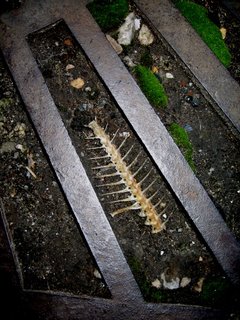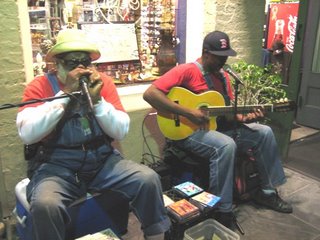
I was in New Orleans a year before Katrina, and now have had the chance to return a year after Katrina. The city has a strange feel, something difficult to put a name on, but it is very palpable. Maybe it's the ghosts. Not just those from the storm, but those from times past, back to haunt the city. The streets which once teemed with people are now much quieter.
I remember watching the crowds of people on the streets in 2004, going to and from work, bustling along like a crowd in any other big city, some singing, some frowning, some walking in groups and some hustling along. Like the downtown we have seen in other southern cities, the vast majority were working black people, getting on and off the buses in swarms in the early morning and late afternoon. Now most of those folks are simply gone. By comparison, the streets now seem almost deserted.
We took the Katrina disaster tour around the city in a small tour bus to see the effects of the disaster up close, and it's shameful what is happening here. The stories and the pictures you have seen in the press are much better than anything I could produce, but the miles and miles of damaged, destroyed, and abandoned houses is shocking in its scope. There are still huge communities, and neighborhoods, almost completely abandoned. The local retail network is gone as well. We saw closed, abandoned Wallmart's on this tour for gods sake. This is not just the poor people either, I saw many houses that around here would bring 2.5K to 1.5 million around here. Folks say they are mostly fighting with insurance companies and red tape.
Less than half the original population has been able to return to the city. Huge sections are simply abandoned, and sit silent and rotting away. Everywhere in the occupied parts of the city there are help wanted signs in the windows. Many more jobs than there are people to fill.
The locals say the big problems are lack of housing and the high cost of living. I heard this afternoon that the cost of electricity is nearly four times higher than before the storm. Rents are more than double, if you can even find a place to live.
It's also clear that the people here have not forgotten the failure, and continued failure, of the federal government to come to their aid. Several of the speakers at the conference I attended mentioned the President's fly-over, his slapping FEMA Director Michael Brown on the back with a "Brownie, you're doing a heck of a job", and then his return to stand in front of the Saint Louis Cathedral in Jackson Square to tell them that he and the American People would do whatever it takes to provide the help they needed. With the background lit by generator powered klieg lights, he promised to start a program larger than the Marshall Plan that rebuilt Europe after the second World War. Of course they haven't seen him or the help since then. His people are on it, somewhere filling out paperwork and writing reports, earning Three Figure Salaries doing it. Someplace cozy and far away.

President Bush in New Orleans 9/15/2005 AP Photo
During my trip in 2004 the plaza out front of this church was filled with street musicians playing for the tourists, and tonight it was completely silent. Only a few homeless people occupying some benches.
The locals are also very quick to tell you that it wasn't the storm, or the storm surge, that destroyed their city, it was the failure of the containment walls that were supposed to hold the water in the canals. The levees around the city all held, and the storm surge didn't overtop them. The pilings driven into the bog to hold the canal walls were simply too short to do the job. Again it was the federal government and the Corp of Engineers that let them down.
Folks are also pretty angry at most of the national press for coming in briefly from time to time since the storm and reporting only on rumors of disease and crime, and then leaving. Then it's up to the local press to try and correct the misinformation. During a talk today at the conference I'm attending, John Pope, a reporter from the Times-Picayune , described this as "sweeping up after the elephants". When John was describing the events surrounding the floods, and the problems encountered since, there were several times he had to stop and gather himself to keep from breaking down.
He did praise CNN, NBC, and the New York Times, for keeping the story alive.
Up near Bourbon Street there is some activity. I found these guys, Stony B and blind Grandpa Elliott, playing blues on a street corner. This was the best thing I saw or heard during the whole trip.








